- Home
- Jennifer Donnelly
The Winter Rose Page 11
The Winter Rose Read online
Page 11
"I did. I've heard that particular speech a thousand times. I've attended him at the most awful births and I've seen him read--even eat a meal-- while his patients were in agony. I've wanted to run away, right out of their homes, but I didn't. I knew I was all they had. I could rub their feet. Let them grip me hands. If I'd have left, they'd have had no one. Just him. Looking at his watch and frowning and telling the poor miserable things to bear up. Spouting Genesis at them: �In sorrow thou shalt bring forth children'--the pompous ass. Telling them to think of Jesus. Jesus?" She laughed bitterly. "I don't know much about your Jesus, but I do know he was a man and he never had himself a baby."
"Before I took the job, people told me Gifford was a saint. For using money from his Harley Street practice to minister to the poor at Varden Street."
"Oh, please. I do the books for both surgeries. He makes more off his Whitechapel practice than he does at Harley Street. Cramming in fifty or sixty patients a day, and spending all of ten minutes with them ...well, you add it up."
"I can't continue to work for him. I can't," India said.
"Don't start that again," Ella warned. "You're needed in Whitechapel."
The two women crossed the street in front of a synagogue. India heard prayers coming from within and realized they were in the heart of Jewish Whitechapel, an enclave of streets and courts clustered north and south of Whitechapel High Street, bounded by Aldgate to the west and the Jews' Burial Ground to the east.
It was early, not six a.m. yet, but the streets were already bustling with people. Tailors carried heavy piles of piece goods on their shoulders. Cabinet-makers lugged canvas bags containing planes and chisels. Bakers' boys balanced baskets of black bread on their shoulders. Inside the doorway of a narrow slaughteryard, a shochet sharpened his knife.
Wagons with Hebraic writing on their sides stopped to deliver produce or coal. Notices pasted on billboards announced a speech by Prince Kropotkin, the celebrated Russian anarchist, a meeting of Polish socialists, and the services of a matchmaker.
And the languages. India had never heard so many different tongues on one London street. A woman called out to Ella from her stoop. Ella an-swered her.
"Was that Russian?" India asked.
"Yes, my family's from St. Petersburg." Another woman waved. Ella greeted her in a different-sounding tongue. "That was Polish," she said. "I speak a bit of it. You'll also hear Romanian, Dutch, German, and Litvak here. Some Bessarabian. Ukrainian, too. Everyone comes from somewhere else. Most of the children speak English. Some of the parents. None of the grandparents."
"My goodness! How does anyone understand anyone else?"
"Yiddish."
India was puzzled. "In which countries is Yiddish spoken?"
"All of them."
"How can that be? How can everyone understand it? Where does it come from?"
Ella laughed. "Yiddish? It comes from the heart," she said. She stopped in front of a humble brick building. "Here we are at the caff. Let's eat. I'm famished."
India noted the gleaming windows, the freshly painted sign. moskowitz's restaurant , it read. wholesome kosher food . The tiny establishment was packed. Workmen and factory girls sat elbow to elbow. Housewives lined up three deep at the counter, buying beigels for their family's breakfast. Bearded elders sat around a samovar, sipping cups of strong, sweet tea, gnarled hands curled around walking sticks. Here and there new im-migrants sat nibbling rolls, wideeyed and uncertain, the women as bright as parrots in their flowered shawls.
Ella found two seats at a table, then went off in search of her mother. India sat down, tucking her doctor's bag underneath her. A pot of tea arrived. She poured herself a cup, drank it black, then closed her eyes. She felt she could sleep sitting up.
Neither she nor Ella had slept all night. The birth they'd been called to, in Dolan's Rents, a row of rundown houses on Dorset Street, one of Whitechapel's worst, had been a difficult one. The woman--a Mrs. Stokes--had been in labor for over twenty hours with little progress, and both mother and infant were in distress by the time they'd arrived. They'd found Mrs. Stokes whimpering between contractions and screaming during them. India had quickly taken off her jacket, tied an apron over her clothing, and rolled up her sleeves while Ella unpacked her instruments.
Mrs. Stokes's husband was nowhere to be found. Her three young children were cowering in the corner. "Have you any hot water?" India asked them. The eldest nodded and pointed to a kettle on the hob. "Pour it into a basin, please, and get me some soap," she instructed. When her hands were scrubbed, she began the examination.
"I sent for a doctor," Mrs. Stokes rasped. "No midwife. Midwife almost killed me last time."
"I am a doctor, Mrs. Stokes," India said. She began the examination, coaxing the woman to bring her feet together and drop her knees. Speaking to her in low, soothing tones, she placed one hand on her stomach, and pushed the other inside her, feeling for her cervix and the baby. "An inch and a half. Occiput posterior," she told Ella. She listened for the baby's heartbeat, then said, "Random fluctuations. Possible cord compression. Contracted pelvis."
Ella nodded, understanding the verbal shorthand. Mrs. Stokes was nowhere near fully dilated. The baby was trying to come out face up. The back of its skull was pressing against its mother's spine, making an already painful process worse. Its heartbeat was abnormal, possibly because its um-bilical cord was constricted. In addition, Mrs. Stokes's pelvis was deformed. India had expected it. Poor women usually suffered from rickets, a disease of malnutrition. Rickets caused malformed bones, which in turn led to horribly obstructed labors.
By the time India finished her exam, Ella had readied a forceps, clamps, scissors, gauze, needles, a spool of suturing silk, carbolic, and chloral. She then reached into India's bag for one last instrument--a cephalotribe.
India looked at it and shook her head. It was a forceps-like instrument, and was used only when there was no hope for the baby and no other way to save the mother. Its wide, powerful blades were designed to collapse an infant's skull so that the dead child could be pulled from its mother's body. India had one in her kit--there was no choice--but she despised the sight of it. Butchers used them. Butchers, drunks, and incompetents.
"Put it back," she said. "I haven't used one yet. I won't tonight."
"Are you sure? Dr. Gifford always wants one prepared."
"Dr. Gifford's not here. I am."
Although Gifford had not allowed them to take any chloroform with them, India had had a little in her own kit. It wasn't much, but it might beat back the pain enough to allow the mother to stop screaming and start breathing, and allow her contractions to pick up, her cervix to stretch and efface, and her ligaments and stunted bones to shift, just slightly, just enough to give India the space she needed to ease the baby out.
Ella dampened a cloth with the chloral sparingly, as if it were liquid gold, and held it over Mrs. Stokes's nose and mouth. The suffering woman clutched at her wrist, weeping with relief, and India silently cursed Gifford.
When the drug had taken effect and Mrs. Stokes was calmer, India and Ella sat her up on the edge of her bed. India had heard good, experienced midwives tell how sitting upright, leaning against a wall, or walking around the room often helped bring a baby faster. India had sought these women out during her student years. They'd taught her about the benefits of massage, the efficacy of herbs, and how important it was not to hush a laboring woman, but to let her howl, for it would open her up.
For hours, all throughout the long night, India and Ella worked in con-cert. They walked with Mrs. Stokes when she could manage it, and let her lie down and weep when she could not. They rubbed her temples, arms, and legs; applied hot compresses; fed her teas of pennyroyal and ginger; gave her castor oil; and sparingly doled out the chloral.
The hours dragged on. Mrs. Stokes dozed briefly. India and Ella grew tired themselves, and hungry, and Ella remembered she had their left-over dinner with her. She unwrapped it, and India was glad of some su
stenance--until she heard a whimper and looked across the room, where the children had been dozing, and saw the youngest staring at the food hungrily. She and Ella looked at each other, and then Ella took the leftovers to them.
"Is my mummy going to die?" the youngest asked when she'd finished. "I'd be afraid if she did. My dad hits us. My mummy tries to stop him. He says we're ugly little bastards and not his. Am I, miss? An ugly little bastard?"
India was speechless for a few seconds, then she said, "No, my sweet-heart. You are beautiful. Very beautiful. And do you know what?"
"What?"
"There's a wonderful story about a little creature whom everyone called ugly. They called him names and he was very sad, but then something won-derful happened to him. It was my favorite story when I was your age. Shall I tell it to you?"
"Yes, please!"
India pulled the little girl onto her lap and told her the story of the ugly duckling. And when she got to the part where the duckling learned that he was a swan, and beautiful, the little girl's eyes were shining.
India loved that story, for she had been that duckling. At five, when she had run across the lawn to show her father a robin's nest she'd found, and he called it a dirty thing and slapped it out of her hands. At ten, when she got her first pair of spectacles and Maud called them ghastly. At sixteen, when her mother told her she would never be pretty, so she would have to be charming. There were so few times, so few places, she had ever felt a swan. In the nursery with Hodgie, her nanny, who told her stories by the fire. With Hugh, who'd held her in the dark and told her she was beautiful. And in London. At medical school.
The little girl kissed India's cheek and thanked her. Sleepily, she said, "I wonder what that feels like." India carried her over to the pile of old coats, sacking, and rags that served as the children's bed and laid her down.
"What what feels like?"
"Being a swan."
India didn't know how to answer. She tried to frame a reply, but before she could get any words out, the little girl had fallen asleep. She gazed down at her, her heart aching, wanting to tell her and not knowing how.
"India, she's ready to push," Ella said.
Mrs. Stokes was back on the bed now, panting and straining.
"Good," India said. She left the children, and bunched up an old blan-ket, a tattered sheet, and her own duster--there were no pillows--and placed them behind their mother's back.
"I want you to curl forward, Mrs. Stokes. Round your back, there you go. Now tuck your chin into your chest and grab your thighs."
Mrs. Stokes shook her head. "I can't do it," she sobbed. "Not again. I just can't. The last one tore me so."
India had seen the scars. "We won't let this one. We'll go slow and you'll be all right." Mrs. Stokes's eyes searched hers and India saw she didn't believe her. "Trust me. And help me. When I say go, give it all you've got. To the count of ten, then rest. All right?"
Mrs. Stokes nodded. "Good. Deep breath, and...push!"
For nearly two hours Mrs. Stokes pushed, with India and Ella holding her legs and cheering her on. She panted and cried and heaved, and between each contraction she swore she could not push even one more time, but then Ella would wipe her face and India would coax and the urgency would come on her again and she would.
Finally, at 4:30 in the morning, the baby's head crowned. "Easy now. Take a breath, Mrs. Stokes. That's it. Stop pushing for just a second... hold on... almost there..." India said, carefully easing the baby along. And then its head was out and Mrs. Stokes fell back against the bed and laughed out loud with the relief of it.
But India did not join her. She had seen the cord wrapped around the baby's neck and the bluish tinge of its skin. "Clamp it, Ella," she barked.
Ella swiftly clamped the pulsing cord in two places. India cut between the clamps, then pulled the cord away. She tugged the baby--a boy--all the way out. He was motionless.
"Come on now, old chap," she whispered, laying him on the bed. She swept his mouth clean with her finger and suctioned his nose. When he didn't respond, she picked him up, supporting his back with her left hand, holding his legs with her right, then gently arched his spine, pushing his chest up and out, allowing the abdominal organs to drag the diaphragm downward and suck air in. Then she carefully bent his tiny body the other way, bringing his knees to his face to force the air out. He wanted to go back, but she wouldn't let him. He was hers. All through the long, tortured night she'd coaxed him here, and she wasn't about to let go of him now. Two more fiexes and compressions. Nothing. Another three, and then miraculously he twitched and mewled, and the mewl became a cry and India heard his mother let out a great sob and she knew she had them both, mother and baby--breathless, bruised, and battered--but here. In this world. Alive.
This is what it feels like, she thought, smiling, as she wrapped a cloth around the baby and held him close, just for an instant. She glanced over at the children. They were still asleep. She wished the little girl was awake. She would hand her her brother and tell her this was what it felt like to be a swan....
"Wakey, wakey."
India opened her eyes. Ella was back with a plate of toast and a pot of jam. She sat down across from her. "What a bleedin' night. And you know we're going to be back there in nine months' time, don't you?"
"If we are, it'll be with a coroner," India said grimly, remembering what she'd told the woman before they'd left: "Mrs. Stokes, you cannot bear an-other child. You must stop having relations with your husband."
"How am I to do that?" Mrs. Stokes had asked, bewildered.
"You'll have to tell him no," India had replied.
Mrs. Stokes had looked at her in disbelief. "Missus," she said, "have you ever tried to tell a fifteen-stone bricklayer no?"
Ella had cut in then. She'd told Mrs. Stokes to use a hollowed-out lemon half or a small sponge soaked in vinegar. Mrs. Stokes said she'd tried both of those and a fat lot of good they did. She still ended up pregnant. India told her she could get a cap from certain chemists. Mrs. Stokes had shaken her head. "You're not from these parts, are you?" she asked. "I can find the sort of chemists you mean, but I can't pay them. Nobody can. The bloody things cost two shillings and thruppence apiece."
India had looked at the poor woman, half-dead. At the baby hungrily seeking milk its mother could barely produce. She had looked at her wide-eyed kids and she'd known she would have to find a way to help her. But how?
"We have to do something for her, Ella," she said now, pouring herself more tea. "We have to."
"I know, but what?"
India sipped her tea then said, "Dispense birth control."
"I told you earlier, that's a very dangerous idea."
"I got it from you."
"Me?!"
"Yes, you. Remember what you said yesterday... regarding morality and helping suffering people?"
Ella shook her head. "Don't pay attention to what I say. I talk too much."
"Your words stayed with me. They made me think."
"Uh-oh."
"About Mrs. Stokes and others like her. About the things I saw in medical school. Infants smothered by broken-down mothers driven mad from their crying. A pregnant, unmarried teenager beaten to death by her father. Women damaged beyond repair by too many pregnancies."
"Blimey, luv. You're a right ray of sunshine this morning, you."
"We have to do something, Ella. We have to make a start."
"Can I eat me breakfast before we save the world?"
"I'm very serious."
"Come on, India. What can we do, the two of us? Nothing."
"Something."
"What?"
"Provide free medical care to the women and children of Whitechapel."
Ella, who'd taken a bite of toast, nearly choked on it. "Is that all? And here I thought it might be complicated."
India fixed Ella with her intense gray eyes. She'd known her only twenty-four hours, but already she felt close to her. Maybe it was the kindness she saw
in Ella's eyes, so dark and warm, so different from her own. Maybe it was having brought a new life into the world together. Maybe it was sheer exhaustion, but for some reason India felt she could tell her anything.
"I want to open a clinic someday, Ella. For the poor. To minister to the ill, but to do more, so much more. The best medicine is preventive, you know, not curative. If we can get to children while they're very young-- before they're born, even--we can break the cycle. We have to start in the womb. Give pregnant women and babies good care, educate new mothers on nutrition and hygiene. Help them limit the size of their families..."
India was so busy talking, she hadn't noticed that Ella had stopped eating. She hadn't seen her pull a small book from her bag. She saw it now, though, as Ella pushed it across the table. Introductory Notes on Lying-in Institutions, by Florence Nightingale.

 Rogue Wave
Rogue Wave Waterfire Saga, Book One: Deep Blue (A Waterfire Saga Novel)
Waterfire Saga, Book One: Deep Blue (A Waterfire Saga Novel) Revolution
Revolution The Wild Rose
The Wild Rose Waterfire Saga (4 Book Series)
Waterfire Saga (4 Book Series)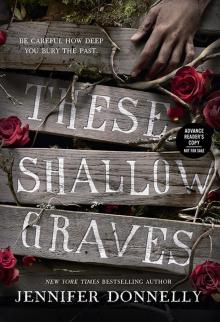 These Shallow Graves
These Shallow Graves Beauty and the Beast: Lost in a Book
Beauty and the Beast: Lost in a Book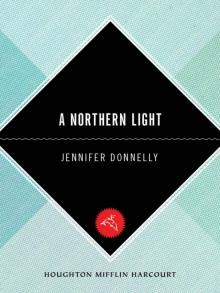 A Northern Light
A Northern Light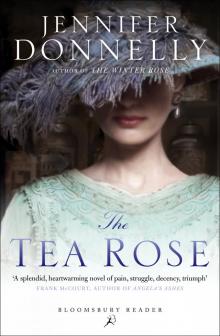 The Tea Rose
The Tea Rose Waterfire Saga, Book Three: Dark Tide: A Deep Blue Novel
Waterfire Saga, Book Three: Dark Tide: A Deep Blue Novel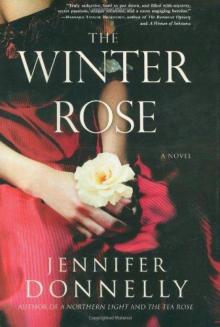 The Winter Rose
The Winter Rose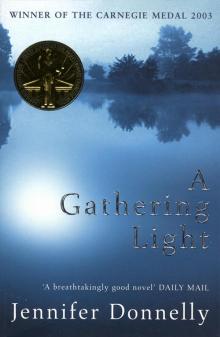 A Gathering Light
A Gathering Light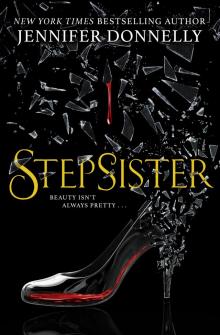 Stepsister
Stepsister Waterfire Saga, Book Four: Sea Spell: Deep Blue Novel, A
Waterfire Saga, Book Four: Sea Spell: Deep Blue Novel, A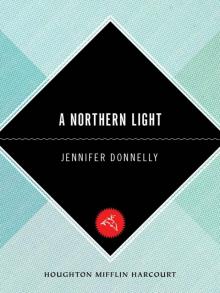 Northern Light
Northern Light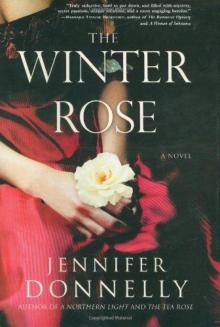 Winter Rose, The
Winter Rose, The